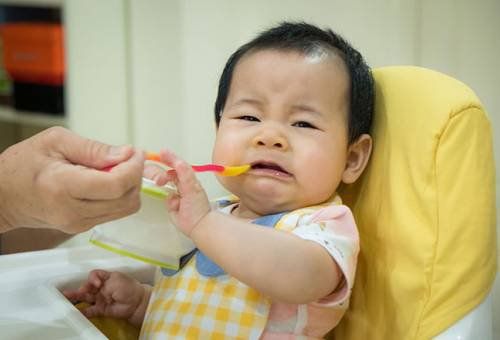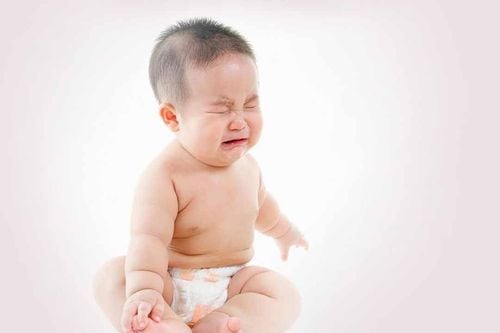This is an automatically translated article.
In the process of taking care of children, many times parents have to see their children sick with many unpleasant symptoms, one of which is anorexia in children. In order for this situation not to affect children much, parents need to learn carefully about pathological anorexia.1. What is pathological anorexia?
Pathological anorexia in children is a common symptom when children have diseases related to the digestive system. Especially children who are in the teething stage are susceptible to mouth injuries, which leads to anorexia. When experiencing anorexia pathological, children often have symptoms such as difficulty chewing and swallowing, no appetite when eating.... If these conditions are prolonged, it is easy for children to become extremely anorexic.2. Causes of pathological anorexia in children
Thorough understanding of the causes of pathological anorexia in infants and young children not only helps mothers treat their children's anorexia, but also restores their children's healthy health. Anorexia in children is often caused by the following reasons:Digestive disorders or poor digestive function: In this case, the children will often feel abdominal pain, nausea every meal, heavier than apples constipation, acute or long-term diarrhea, ... these symptoms all make children not want to eat anything or eat very little. The cause of these digestive system diseases is often due to the baby's intestinal tract being disturbed, secretion disorder or abnormal contractions in the intestines and stomach. Teething process: This is a very normal stage of development in young children, but when many children experience discomfort in the oral cavity, causing anorexia. Infections: Your baby's immune system is still very weak and immature, so it is difficult for him to fight off all kinds of harmful bacteria. That's why babies are prone to minor illnesses such as fatigue, flu, cough, ... even more severe respiratory infections (pneumonia) and digestive diseases such as enteritis, gastritis, etc. ... At the same time, infection also causes the content of nutrients and minerals (such as vitamins A, C, B, zinc, magnesium, iron, ...) to be lost, causing anorexia. Sometimes treating bacterial infections requires antibiotics, but these same drugs lead to dysbiosis, indigestion, bloating, and loss of appetite in children. Medicines: When sick, children often have to be treated with drugs, vitamins or some antibiotics for the indicated time to help kill harmful bacteria. However, mothers also need to be careful because these drugs are also very easy to cause anorexia in children. Some other diseases: otitis media, sore throat, fever, parasitic infections such as worms, ... are also among the factors that make children not want to eat.

Một số loại thuốc có thể gây biếng ăn bệnh lý ở trẻ em
3. How to treat physiological anorexia in children
Children who are anorexic due to illness often have a general state that they do not eat well and are tired at every meal. Prolonged anorexia easily makes the amount of minerals and nutrients in the baby's body deficient, affecting the baby's future development. To overcome this situation, mothers need to ensure a suitable diet, a balanced daily diet to strengthen the baby's resistance as well as physical strength. In addition, mothers also need to pay attention to ways to overcome pathological anorexia in children as follows:Create a happy and comfortable atmosphere before and during eating to stimulate interest and joy in eating in children. Food should be presented attractively and beautifully to stimulate the baby's eyesight. Balance 4 groups of substances in a meal for children, including protein, carbohydrates, vitamins, fats and minerals. In particular, mothers should supplement essential micromineral groups such as vitamins A, B, C, iron, zinc, magnesium, selenium, chromium, vitamins B1 and B6, ginger to improve taste, eat well, and gain height. and weight right and beyond the standard, good immune system, enhanced resistance to less sickness and less digestive problems. Do not overuse antibiotics when treating the disease because it will cause intestinal disorders, causing indigestion, bloating and loss of appetite.

Trình bày món ăn đẹp mắt có thể kích thích sự hứng thú ở trẻ biếng ăn bệnh lý
Pathological anorexia is not too serious, but if parents are subjective, it will easily cause many bad complications for children in the future. Therefore, when detecting signs of pathological anorexia in children, parents need to pay attention, find out the causes, and then take timely and appropriate remedial measures. In the case of children with prolonged anorexia, malabsorption, and growth retardation, parents should supplement children with supportive products containing lysine, essential micro-minerals and vitamins such as zinc, chromium, selenium, and B vitamins. help meet the nutritional needs of children. At the same time, these essential vitamins also support digestion, enhance nutrient absorption, help improve anorexia, and help children eat well. Parents can simultaneously apply dietary supplements and functional foods derived from nature for easy absorption. The most important thing is that improving your baby's symptoms often takes a long time. Combining many types of functional foods at the same time or changing many types in a short time can make the baby's digestive system unable to adapt and completely not good. Therefore, parents must be really patient with their children and regularly visit the website vimec.com to update useful baby care information.













